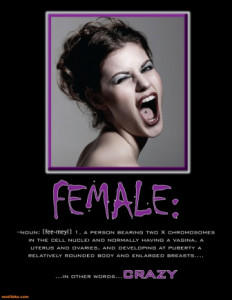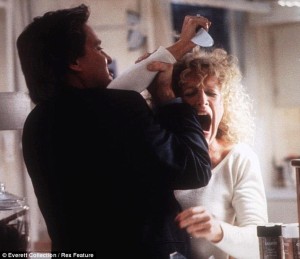We have all called someone or something crazy. Whether we are talking about an ex or current boy/girlfriend, the latest performance by that popular artist, or even that new movie that just came out, we have all used that word crazy. What do we really mean when we call someone or something crazy? The word crazy, originally used to describe the mentally deranged, or someone with a mental disorder, does not exactly mean that in today’s society. Now, I know when I call my ex crazy, I am not saying he is borderline schizophrenic, I mean he was doing a lot of things that I did not like or want him to do. I intend on looking into how people use the word crazy; whether or not they are using it to actually describe someone displaying a mental disorder or something they believe is ‘not normal’.
(Photo right: http://theoldspeakjournal.wordpress.com/2011/12/23/a-message-to-women-from-a-man-you-are-not-crazy/)
In today’s culture, many words have different meanings than intended, like the word crazy. Other examples would be the words awesome meaning something inducing awe or being awe struck but nowadays used to say something is cool, and fat meaning plump but used to also mean lazy, obese, and ugly. Some words with the alternate meanings do not make too much of a difference, such as awesome, but other words, such as crazy or fat, are hurtful and could be damaging to the person being labeled. Harris O’Malley’s article, “On Labeling Women ‘Crazy’”, explains how men calling their ex or current girlfriend crazy is belittling the women in the relationship. It is making her feelings unimportant because the man does not like it or want to deal with it. He goes on to explain how other words such as irrational and over-reacting do the same.
According to Abigail Tucker, author of the article “History of the Hysterical Man”, states that the term ‘hysteria’ comes from the Greek word for womb or uterus. This illness of hysteria was exclusively diagnosed to women only(Tucker). Some of the symptoms include loss of appetite, nervousness, irritability, fluid retention, emotional excitability, outbursts of negativity, and excessive sexual desire among other symptoms (O’Malley). While men could display similar symptoms, women were the only ones called hysterical. We can see this today where people will refer to women as crazy when they are acting in a non-stereotypical “women fashion” of being timid, gentle, and kind.
Several movies play off this idea of the ‘crazy’ woman. For example, the 1987 movie Fatal Attraction portrays this perfectly. The movie is about a man who seemingly has it all: a beautiful wife, a happy daughter, a well-paying job, and a cozy place to live. He runs into an attractive woman at a party and thinks nothing of it until she starts a job at his place of employment. With his wife and daughter out of town for the weekend, he and this woman have an affair. This women leads the man to believe that she is okay with it being a one time occurrence, but as the movie progresses, she clearly does not. She ends up trying to get him to leave his perfect life and be with her. She takes it to the extreme and breaks into his home, harasses and almost kills his wife. The struggle is ultimately resolved with the other women being shot and drowned.
This photo is a scene from Fatal Attraction (1987), where Dan tries to fight off his obsessed lover.
http://www.dailymail.co.uk/tvshowbiz/article-2335436/Glenn-Close-says-approach-Fatal-Attraction-role-totally-differently-today-knowledge-mental-illness.html
This movie inspired the indie-alternative rock band, Alt-J (∆), and director, Ellis Bahl, to create a music video similar to the movie for the song Breezeblocks. The song, while it sounds very happy, has a very different and slightly dark meaning behind it. The video, which is based off the movie Fatal Attraction, is in reverse. The opening scene is a women submerged in a bathtub filled to the top with water, and a breezeblock (cinder block) holding her down. There is a man with a wedding band on, sitting next to the tub looking very guilty and distraught. The video, in reverse, shows the struggle of how they got to that situation. It is not obvious throughout the video as to whom the aggressor truly is, and at the end, more people are still confused. Within the video, you see the man attacking the women with the cinder block, the women throwing glass bottles, the man slamming the women against a bookcase, and the women creeping up on the man with a knife. When you understand the relationship between the music video and the movie Fatal Attraction, you start to figure the video out better.
I got a bunch of people to sit down, watch the music video, and be interviewed. Most people involved have never seen the video, or even heard of the band Alt-J before, while others have. I told my participants to watch the video and make comments throughout stating what they were thinking and to describe the man and women. After the video was over, I asked them a few questions regarding what they thought was going on and how they would describe the main two characters in the video. After that, I explained the movie Fatal Attraction and how the movie fits in with the music video. I had them describe the man and women again. Several participants used the word crazy, and I had them, at the end, explain what they believe the definition of crazy is. In total, I interviewed 18 people. Two people were not used at all, and one person’s video clip was used closer to the end, but not during the music video. Some people were featured more in the interview than watching the video. That is due to the lack of comments they made while watching. Others were used more while watching the video than in the interview. That is due to a few requests of not using that footage, and responses that did not relate to what was being looked at.
All the people interviewed were very intrigued by the song and video. Many people also used the word crazy to describe both the man and the women. However, more people used it to describe the women. Before I talked about the movie Fatal Attraction, many people felt bad for the woman, and thought the man was being the aggressor. They thought he was even more of a jerk when they saw a random second woman trapped in a closet. Few thought he changed throughout the video. He started more aggressive, and then most thought he was more protective at the end. Most just thought the man was a jerk throughout by saying he was forceful, aggressive, and crazy. There were many comments made towards the woman that pinned her as the victim but most viewed her as a crazy, scary, and aggressive woman.
After describing the movie, and how it relates to the music video, more people thought the man was just doing what was right by defending his home and wife, despite the fact that he still killed the woman. The views on the woman stayed consistent on crazy. After asking questions about the characters in the video, I asked the participants who said the word crazy, psycho, or alluded to ‘crazy’ in any other phrase for a definition. Most of the definitions were describing something that is not normal, or out of the ordinary. Very few people noticed how our culture today uses the word crazy to describe something that is not a mental disorder.
There are many different ways we can look into this issue and how to change it. We can dive in deeper from a psychological perspective and look how calling a woman crazy is related to hostile sexism. We could also look into how the woman in the closet, in the video, needs to be ‘taken care of’ showing how defenseless she is, making an example of benevolent sexism. This article’s purpose was to bring attention to the fact that this culture uses the word crazy that is not correct by definition. When used referring to women, it is belittling and emotionally hurtful. Then next step to change this is to recognize how to use the word in a correct context and try to stop using it to describe your girlfriend asking to take her out to an expensive dinner, Miley Cyrus, or the new Hobbit movie that just came out.
References:
Alt-J. “Breezeblocks.” An Awesome Wave. Infectious Music. 25 May 2012. CD.
Fatal Attraction. Dir. Adrian Lyne. Per. Michael Douglas, Glenn Close, Anne Archer. Paramount Pictures. 1987.
O’Malley, Harris. On Labeling Women ‘Crazy.’ Huffington Post. 12 Nov. 2013. Web. 21 Nov. 2013. <http://www.huffingtonpost.com/harris-oamalley/on-labeling-women-crazy_b_4259779.html>
Tucker, Abigail. History of the Hysterical Man. Smithsonian.com. 5 Jan. 2009. Web. 26 Nov. 2013. <http://www.smithsonianmag.com/science-nature/History-Of-The-Hysterical-Man.html>


